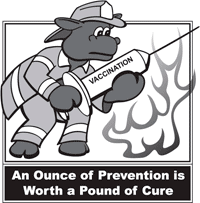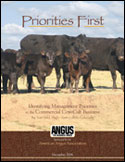
Kris Ringwall
Beef Talk
An ounce of prevention is worth a pound of cure.
The Benjamin Franklin axiom that "an ounce of prevention is worth a pound of cure" is as true today as it was when Franklin made the quote. Although many use the quote when referring to health, Franklin actually was addressing fire safety.
Franklin wrote this (courtesy of www.ushistory.org) under an assumed name. He said, "In the first place, as an ounce of prevention is worth a pound of cure, I would advise 'em to take care how they suffer living coals in a full shovel, to be carried out of one room into another, or up or down stairs, unless in a warming pan shut; for scraps of fire may fall into chinks and make no appearance until midnight; when, your stairs being in flames, you may be forced (as I once was) to leap out of your windows and hazard your necks to avoid being oven-roasted."
We should all relate to Franklin. Regardless of the endeavor, our tendency is to be a bit sloppy at times. For the unfortunate few for whom the hands of chance all line up, disaster is the outcome.
 Franklin also related the status quo response, at least as was the status quo in Philadelphia. "Soon after it [a fire] is seen and cry'd out, the place is crowded by active men of different ages, professions and titles who, as of one mind and rank, apply themselves with all vigilance and resolution, according to their abilities, to the hard work of conquering the increasing fire."
Franklin also related the status quo response, at least as was the status quo in Philadelphia. "Soon after it [a fire] is seen and cry'd out, the place is crowded by active men of different ages, professions and titles who, as of one mind and rank, apply themselves with all vigilance and resolution, according to their abilities, to the hard work of conquering the increasing fire."
If one sits back and reflects, what Franklin describes is not that different than the state of animal health and our response to dire situations. Carrying lit coals up and down wood stairs in poorly designed or improperly used containers served to spread inconspicuous "scraps of fire" that later flare up into a major fire.
We transport livestock up and down many roads without properly designed or implemented biosecurity procedures. This can lay the seeds of disease that come out of dormancy later and bring a major disease outbreak. Our response, like Franklin's well-meaning entourage of well-intended but poorly trained and organized volunteers, may get the problem cleaned up, but not very effectively, and oftentimes at great public expense and personal loss.
Franklin, having been in other cities that were better prepared, encouraged "a club or society of active men belonging to each fire engine, whose business is to attend all fires with it whenever they happen." The process was adopted, and Philadelphia's firefighters became more effective with good training and organization.
This preparation, "an ounce of prevention is worth a pound of cure," resulted in not only the professional establishment of the Union Fire Co. on Dec. 7, 1736, but also the subsequent education about fires to the general public.
 Their equipment included "leather buckets, with strong bags and baskets (for packing and transporting goods), which were to be brought to every fire. The blaze battlers met monthly to talk about fire prevention and fire-fighting methods. Homeowners were mandated to have leather fire-fighting buckets in their houses."
Their equipment included "leather buckets, with strong bags and baskets (for packing and transporting goods), which were to be brought to every fire. The blaze battlers met monthly to talk about fire prevention and fire-fighting methods. Homeowners were mandated to have leather fire-fighting buckets in their houses."
This organized prevention transformed Philadelphia from an unsafe city to one of the safest cities in America for fire prevention.
Perhaps today is one of those days that one needs to simply sit back and reflect a little bit.
The animal industry is not unique. We like to think it is, but survival in the modern world does not allow for resting on one's laurels.
The good old days are just that, old. We need to relate to the present, which runs faster and is more demanding.
While we bring much upon ourselves, we need to be prepared, organized and able to respond to a crisis. The best intentions do not alleviate disaster nor mitigate loss. Preparation does; so, today, "an ounce of prevention is worth a pound of cure."
Your comments are always welcome at www.BeefTalk.com.
For more information, contact the NDBCIA Office, 1041 State Ave., Dickinson, ND 58601, or go to www.CHAPS2000.com.




